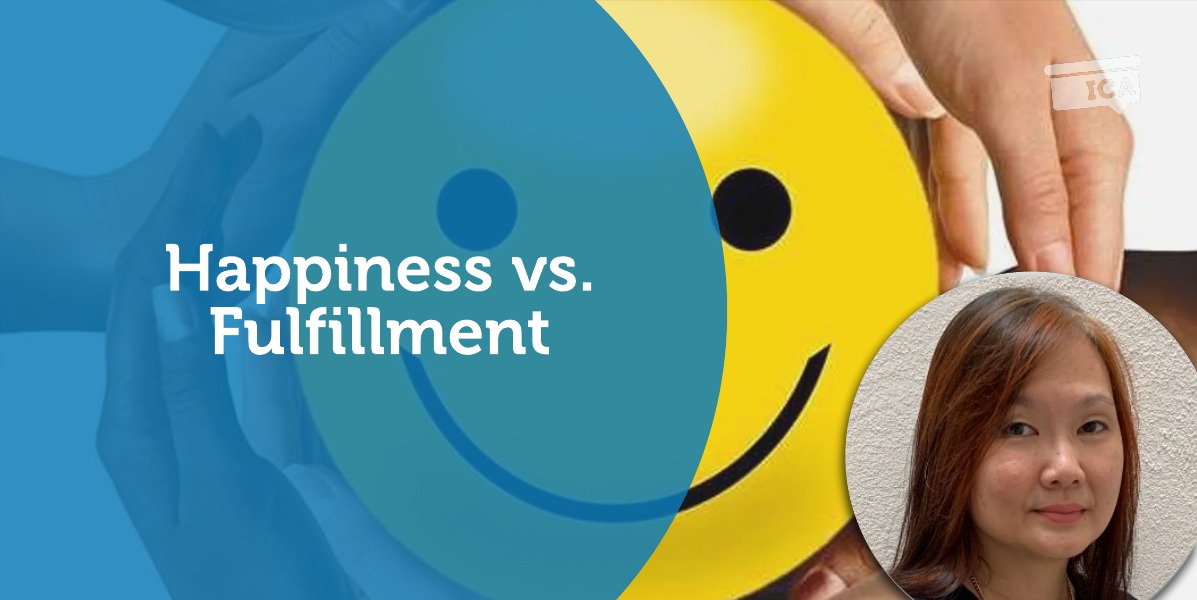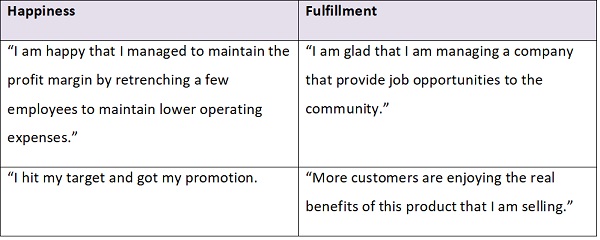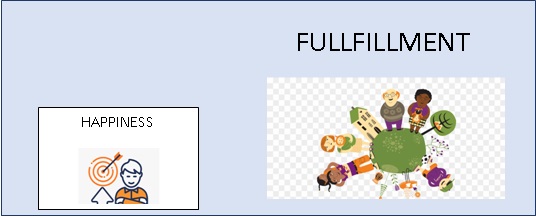 A Coaching Power Tool Created by Yin Yin Sew
A Coaching Power Tool Created by Yin Yin Sew
(Life Coach, MALAYSIA)
Introduction
The studies on Hedonic Treadmill shows that the rise in income does not result in a permanent gain in happiness. In psychology, a hedonic set point is a general baseline level of happiness a person experiences over their lifetimes. It means human beings will naturally adapt back to their hedonic set point in the long term despite positive events and environmental factors that boost happiness in the short term.
The research conducted by Danial Kahneman, the 2002 winner of the Nobel Prize in economics, and Angus Deaton, past president of the American Economic Association concluded that lack of money brings both emotional misery and low evaluation. However, the rise of income beyond USD 75,000 does not necessarily neither increase nor decrease the level of happiness although higher income continues to improve individuals’ life evaluations.
According to Simon Sinek, happiness is what to do whereas fulfillment is why we do it. Happiness comes and goes, the feelings do not last. Hence, happiness is temporary. On the other hand, fulfillment is more underlying and part of something bigger. Hence, fulfillment is more than mere happiness because fulfillment is deep joy and having a sense of purpose beyond self. It is also connecting the work we do to our sense of purpose.
Hence, focusing on happiness in life is the wrong pursuit. It will make us happy in the short-term, but it does not mean that we will have the same level of happiness in the long run. This power tool, “Happiness vs Fulfillment” is designed to help clients to pursue something bigger than themselves and find their fulfillment in life.
Explanation
We only live once. For the working population, we work at least 8 hours a day for 5 days a week. Some of us even work over the weekends. This indicates that we are spending at least one-third of our lives working. Work can make us happy, fulfilled, or miserable. One of the greatest blessings in life is to live our lives especially our working lives because we are spending so much time on work.
Happiness is the feeling of being pleased or happy and happiness is choosing activities based on how happy these activities make us feel. On the other hand, fulfillment is focusing on those things that make our lives more significant and worthwhile.
Examples of Happiness vs Fulfillment

The picture below illustrates my understanding of the differences between happiness and fulfillment. Fulfillment is the intention to contribute to the well-being of others although it is not wrong to experience the happiness of one’s achievements and enjoy life for a moment. In the long run, most people yearn for more.

Pursue something so important that even if you fail the world is better off with you having tried. Tim O’ Reilly
Case study
Veronica is theFinancial Accountant of a multi-national company. Since young, her parents wanted her to be an accountant because it is a stable job. She has been working with this company for 20 years. Her colleagues and friends look highly on her because she is highly educated, qualified, and capable. She works very long hours including weekends because her portfolio covered a few countries. Despite all the challenges at work, she reminded herself that she is blessed with a good job in a good company. Her job pays her well and she does not need to worry about finances.
However, she feels emptiness and meaninglessness deep inside her soul when she is alone. Deep inside her soul, she wanted to be a psychologist that helps people to improve behavior and overcome mental health issues. She dropped the idea of being a psychologist because she does not want to disappoint her parents. She knows her parents wanted the best for her.
Veronica has two choices:
A happy life
Veronica continues to stay on her job as a Financial Accountant and enjoys the stability of life. She has been working hard to get to where she is now. As such, it makes sense for her to stay in the position. Furthermore, her current job provides financial and job stability. It is definitely not easy for her to let go of a good job with good pay that meets her daily needs. At the same time, it is not easy to step out of the comfort zone and start all over again.
A Fulfilled life
Veronica reflected upon this question, “if today were the last day of my life, would I want to do what I am about to today?” She likes her current job and she knows her position is crucial in the organization. No matter how hard she tried to convince herself, she sensed that deep inside her soul, she wanted to pursue her dream of becoming a psychologist. To her, one of the reasons is to help people to overcome mental health issues. She spoke to her friends who are psychologists to better understand their roles. Many of her friends described their jobs as very gratifying and fulfilling while the job can be stressful at times. But, she wanted a change and create a legacy in the field of mental health.
Coaching application
At the beginning of the coaching process, a clear awareness of life values can help the clients to shape their vision for the future that is aligned with their values and purposes. Knowing the values and purposes would help the client to make life choices and have a clear direction for life. When life choices are not made in line with the clients’ values and purposes, the client would not be able to achieve the life outcome they wanted. Additionally, they may experience internal conflicts within themselves.
The coaching process can be designed to help clients achieve their goals in line with their values. During the coaching process, the coach helps the clients to think of small and achievable steps. These steps from the blueprint of action, i.e., the action plan. Next, the coach can work with the clients to prioritize and clarify options. The clients need to stay committed to their action plan. Without a commitment from the clients, their goals cannot be achieved.
Some of the coaching questions that we can ask during the coaching process:
- “If you can take only ten (10) values with you into a strange and possibly dangerous territory, which are the ones you absolutely must have?”
- “What values would you fight for?”
- “What values are so important that you would quit a job if there were violated by your employer?”
- “How would the people who know you best describe what you are like?”
- “Imagine yourself fifteen years from now. What do you think will be the most important to you then?”
- “What are your priorities?”
- “What matters most?”
- “How do you want to feel in life?”
- “What do you really want in life?”
- “How can you overcome what’s holding you back from living the life the way you want?”
- “What is your life purpose statement?”
- “Who inspires you to be the person you wanted to be?”
- “What did you hope for?”
Reflection
In reality, envisioning a clear picture of the future is not easy. It is also not easy to step out of your comfort zone to pursue life values, purposes, and achieve fulfillment in life. There are many considerations in life. The decision made by us may affect the people around us, not just us. Hence, it takes a lot of courage to decide for ourselves to step out of the comfort zone and step into the unknown to seek long-term fulfillment and not mere happiness.
It takes courage to grow up and become who you really are. E. Cummings
Coaching Application
As a coach, I need to know my personal values and purposes to live of life of fulfillment and help others to find fulfilling lives.
Self-application
Some of the questions that I can ask myself:
When working with clients, my coaching approaches depends on the following situations:
The coaching process will help the client to be more aware of where they are now. It is appropriate to explore if the clients need to look inward and examine what they can change within themselves to make they’re work-life more meaningful. If not, we will explore other options that help the clients to find meaning at work. Next, we will determine the goals that they want to work on and explore how they want to achieve the coaching goals. Finally, it is good to discuss when they decide to take the time and make the effort to focus on their values.
Referring to the research by Dr. Susan Krauss Whitbourne on midlife adults, the results have shown that the majority of people are more than willing to sacrifice their own happiness to work on behalf of a larger cause. Perhaps one of the reasons is that midlife adults are typically more financially secure, more life experiences, and hold positions at work and in the community that make them more effective to change. At the end of the day, it is about the feeling of making a contribution to the world that’s going to contribute to your deeper sense of fulfillment. One of the reflection questions on the last day on earth is not “Am I happy?” but “Am I making a difference in the world?”
Some coaching tools that I can apply during the coaching process:
The Values Game
This exercise helps the clients to understand themselves and know their values by prioritizing them. We will ask the clients to define what each one means to them.
Wheel of Life
It’s a simple and easy-to-use exercise that can help clients find out which areas of their lives are most satisfying and where they would like to focus attention on improving their quality of life (The Coaching Tools Company, 2012).
Personal Values Questionnaires (PVQ)
The PVQ is developed by researcher David McClelland. The purpose of PVQ can help the clients to better understand themselves, and think about the choices they make. Most importantly, this tool helps them to ensure that their actions and behaviors are in line with their values to avoid unhappiness and emotional distress due to a mismatch of values and behaviors.
References
Don’t Confuse Happiness with Fulfilment, Simon Snek.
James Chen (2019, 17 July), Hedonic Treadmill.
Gary R. Collins (2009), Helping Others Turn Potential Into Reality – Christian Coaching(2nd Edition), Colorado, NavPress.
Courtney Rubin (2020, September 7). At What Price Happiness? $75,000.
Duckworth, Angela (2017), GRIT – Why passion and resilience are the secrets to success (2nd Edition), United Kingdom, Penguin Random House.
Thomas Oppong (2018, January 17). Your life will be incredibly better if you pursue meaning instead of happiness.
Robert Biswas-Diener (2010). Practicing Positive Psychology Coaching, New Jersey, John Wiley & Sons, Inc.